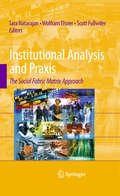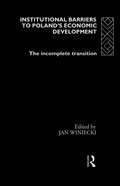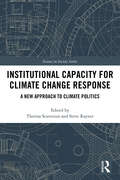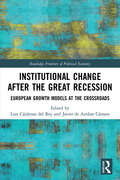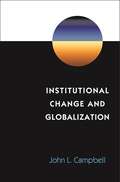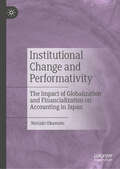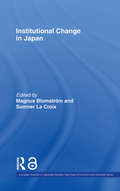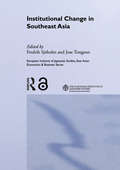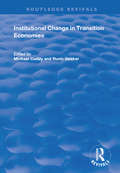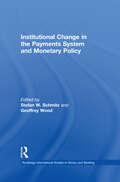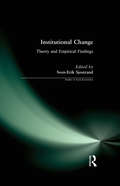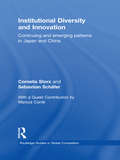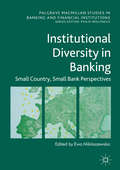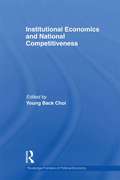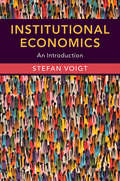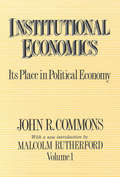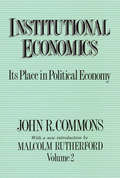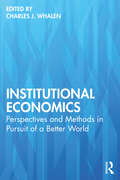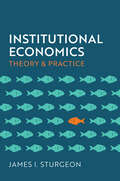- Table View
- List View
Institutional Analysis and Praxis
by Wolfram Elsner Scott Fullwiler Tara NatarajanThe Social Fabric Matrix Approach (SFM-A) is a rigorous and holistic methodology for undertaking policy-relevant, complex systems research. This book contains both extensive applications of the SFM-A to contemporary issues and chapters that embed applied research in relevant theoretical, philosophical, and methodological frameworks. It offers a balance of applications through case studies across regions and topics that span areas of finance, development, education, and environment, to name a few. This book creates new ways of using the SFM and forges previously unexplored connections between institutional economics and other areas of study such as financial markets, micro credit, political economy and sustainable development, thus contextually refining the SFM-A. This book complements F. Gregory Hayden's Policymaking for a Good Society: The Social Fabric Matrix Approach to Policy Analysis and Program Evaluation.
Institutional Arrangements for Conservation, Development and Tourism in Eastern and Southern Africa
by René van der Duim Machiel Lamers Jakomijn Van WijkThis book presents an overview of different institutional arrangements for tourism, biodiversity conservation and rural poverty reduction in eastern and southern Africa. These approaches range from conservancies in Namibia, community-based organizations in Botswana, conservation enterprises in Kenya, private game reserves in South Africa, to sport hunting in Uganda and transfrontier conservation areas. The book presents a comparative analysis of these arrangements and highlights that most arrangements emerged in the 1990s through either a decentralized or centralized change trajectory that was sponsored by donors. They aim to address some of the challenges of the 'fortress' types of conservation by combining principles of community-based natural resource management with a neoliberal approach to conservation, evident in the use of tourism as the main mechanism for accruing benefits from wildlife. The book illustrates the empirical relevance of these novel arrangements by presenting their growth in numbers and discuss how these arrangements differ in their form. With respect to the conservation and development impacts of these arrangements, we show that they have secured large amounts of land for conservation, but also generated governance challenges and disputes on tourism benefit sharing, affecting the stability of these arrangements to generate socioeconomic and conservation benefits.
Institutional Barriers to Economic Development: Poland's Incomplete Transition (Routledge Studies of Societies in Transition #Vol. 2)
by Jan WinieckiPoland's transition from socialism to capitalism has largely been praised as a success story. In reality, however, according to this study, Poland's case is an 'incomplete' transition. Looking at the processes involved in economic transition, covering key issues including financial markets, labour markets, competition and intervention, social security, property rights and attitudes towards the changing political economy, this book provides a wide-ranging and invaluable study of economic development. It will be of great use to economists, those involved in Russian and East European studies, and political scientists.
Institutional Capacity for Climate Change Response: A New Approach to Climate Politics (The Earthscan Science in Society Series)
by Steve Rayner Theresa Birgitta ScaveniusIn a period of rapid climate change and climate governance failures, it is crucial to understand and address how effectively different political institutions can and should react to climate change. <P><P>The term 'institutional response capacity' can be defined as a measurement for how effective political institutions may respond to threats and challenges such as climate change. This book sets out to provide a venue for the discussion of how to conduct climate politics by offering new perspectives on how social and political institutions are capable of responding to climate change. In doing so, the book explores how democracy, institutional design and polycentric governance influence social and political entities’ capacity to mitigate, adapt, address and transform climate change. The book offers building blocks for a new agenda of climate studies by focusing on institutional response capacity and by offering a new approach to climate governance at a time when many political initiatives have failed. <P><P>This interdisciplinary volume is a valuable resource for academics, researchers and policy-makers in the areas of anthropology, political science, geography and environmental studies.
Institutional Change In Turkey
by Leila PiranHow do state institutions reform themselves in the face of outside pressures? This study undertakes an in-depth analysis of the institutional and human rights reform process within the Turkish National Police, which faces pressure from the EU as part of Turkey's EU membership process, and examines the challenges and consequences of the process.
Institutional Change after the Great Recession: European Growth Models at the Crossroads (Routledge Frontiers of Political Economy)
by Luis CárdenasThis book combines demand-led growth models and the institutionalist approach, in order to explain the macroeconomic performance of the main European countries in recent years followed by which a coherent explanation of the institutional change since the Great Recession, including the economic policy response to the economic and financial crisis (2008) and to the debt crisis (2010) is provided. A "Comparative Political Economy" (CPE) analytical framework and provide an institutional base to the different European growth models is built, in general terms over the period 1995-2018. The results allow us to link diverse growth dynamics to the changes of the institutional framework as a consequence of the economic and financial crises. In each chapter for country case studies (France, Germany, Italy, Spain, Greece, Sweden, UK and Poland) there;’s an ntroduction with a general characterization of the country and the most relevant changes that have occurred subsequently (main legislative milestones or changes in the behaviour of social agents) especially the process of dualization or deregulation of European economies. In addition, an analysis of the macroeconomic evolution and the situation of the labour market before and after the crisis from a demand-side perspective is included, concluding with the linkages between both issues and the characterization of the growth model. This book is of special interest to all the students and university professors who will use this book to be able to follow a multitude of subjects from Applied Economy to International Economic Structure but can also be useful for researchers, doctoral students and teaching staff who want to expand knowledge in the fields of comparative political economy, institutions and the European Union. In general, this book is aimed at anyone interested in expanding their knowledge of the evolution of Europe today.
Institutional Change and Globalization
by John L. CampbellThis book is about institutional change, how to recognize it, when it occurs, and the mechanisms that cause it to happen. It is the first book to identify problems with the "new institutional analysis," which has emerged as one of the dominant approaches to the study of organizations, economic and political sociology, comparative political economy, politics, and international relations. The book confronts several important problems in institutional analysis, and offers conceptual, methodological, and theoretical tools for resolving them. It argues that the paradigms of institutional analysis--rational choice, organizational, and historical institutionalism--share a set of common analytic problems. Chief among them: failure to define clearly what institutional change is; failure to specify the mechanisms responsible for institutional change; and failure to explain adequately how "ideas" other than self-interests affect institutional change. To demonstrate the utility of his tools for resolving the problems of institutional analysis, Campbell applies them to the phenomenon of globalization. In doing so, he not only corrects serious misunderstandings about globalization, but also develops a new theory of institutional change. This book advances the new institutional analysis by showing how the different paradigms can benefit from constructive dialogue and cross-fertilization.
Institutional Change and Performativity: The Impact of Globalization and Financialization on Accounting in Japan
by Noriaki OkamotoThis book analyzes the recent development of accounting in Japan from an interdisciplinary perspective, focusing specifically on how institutional reality is constructed. Integrating theoretical perspectives from institutional economics and performativity studies, the book creates a framework to systematically explain institutional changes and dynamics against a backdrop of increasing globalization and financialization. The first part of the book connects Searlean theories of institutional reality and social ontology with studies in performativity, particularly its linguistic aspects, to show how collectively accepted social norms can performatively shape institutions. The second section explores how these patterns can be uniquely traced in the recent history of Japan’s financial accounting standards and institutions, in particular how globalization, financialization, fair value accounting and a shareholder-value primacy form of corporate governance have prevailed. It also explores the establishment of the International Accounting Standards Board (IASB) and the increasing global convergence of accounting standards. The book argues that multiple collectively accepted performative norms can be identified simultaneously in Japanese accounting, as well as discussing how these social dynamisms are identified and dispersed linguistically (such as by researchers and journalists). This book will be of interest to those working in accounting and financial reporting, as well as those working in social studies of finance, economic sociology, and institutional economics.
Institutional Change in Japan (European Institute of Japanese Studies East Asian Economics and Business Series)
by Magnus Blomström Sumner La CroixThis is a new analysis of recent changes in important Japanese institutions. It addresses the origin, development, and recent adaptation of core institutions, including financial institutions, corporate governance, lifetime employment, and the amakudari system. After four decades of rapid economic growth in Japan, the 1990s saw the country enter a prolonged period of economic stagnation. Policy reforms were initially half-hearted, and businesses were slow to restructure as the global economy changed. The lagging economy has been impervious to aggressive fiscal stimulus measures and has been plagued by ongoing price deflation for years. Japan’s struggle has called into question the ability of the country’s economic institutions, originally designed to support factor accumulation and rapid development, to adapt to the new economic environment of the twenty-first century. This book discusses both historical and international comparisons including Meiji Japan, and recent economic and financial reforms in Korea, Scandinavia, Switzerland, and New Zealand, placing the current institutional changes in perspective. The contributors argue that, contrary to conventional wisdom that Japanese institutions have remained relatively rigid, there has been significant institutional change over the last decade.
Institutional Change in Southeast Asia (European Institute of Japanese Studies East Asian Economics and Business Series)
by Fredrik Sjöholm Jose TongzonThis book examines the institutional changes taking place in, and challenges facing, the region since 1997. It also describes various differences in the reform process between countries in the region. Sjöholm and Tongzon argue that the economies of southeast Asia need to reform their institutions if the previous rapid development is to continue. The institutional weaknesses have been addressed to different degrees and with different success in the affected countries. Against the backdrop of southeast Asia's importance in the world economy, it is hardly possible to overestimate the need to understand this process of change.
Institutional Change in Transition Economies (Routledge Revivals)
by Michael CuddyThis title was first published in 2002.The importance of institutions for transition economies has so far been overlooked; Michael Cuddy and Ruvin Gekker bring together leading experts in the field to fill this crucial void in the literature. The contributors concentrate on an ongoing tension between informal constraints and mechanisms and the new formal rules and mechanisms that have gradually evolved through the transition period. Experiences are primarily drawn from Russia. The book consists of three parts, the first comprising an analysis, synthesis and generalizations of the institutional adaptations, as a market economy slowly emerges from a fog of shifting rules and varying interpretations. This is followed by the study of business and taxation authorities’ behavior as they try to minimize or maximize the taxation take. The volume also analyzes the challenges facing central and regional governments in delivering equitable levels of public services across regions of vastly different development levels, while at the same time trying to stimulate regional economic growth.
Institutional Change in the Payments System and Monetary Policy (Routledge International Studies in Money and Banking)
by Geoffrey Wood Stefan W. Schmitz"Central bankers worldwide welcome the recent increase of research on payment systems. This volume, providing an expert overview on this timely subject, should be required reading for us all". - Erkki Liikanen, Governor of the Bank of Finland Monetary policy has been at the centre of economic research from the early stages of economic thought, but payment system research has attracted increased academic attention only in the past decade. This book’s succeeds in merging these two so far largely separated fields. Innovative and groundbreaking, Schmitz and Woods initiate research on the interdependence of institutional change in the payments system and monetary policy, examining the different channels via which payment systems affect monetary policy. It explores important themes such as: conceptualization and methods of analysis of institutional change in the payments system determinants of institutional change in the payments system – political-economy versus technology empirics of institutional change in the retail and in the wholesale payments systems – policy initiatives and new technologies in the payments system implications of institutional change in the payments system for monetary policy and the instruments available to central banks to cope with it. The result is an accessible overview of conceptual and methodological approaches to institutional change in payment systems, and a comprehensive and yet thorough assessment of its implications for monetary policy. The insights this timely book provides will be invaluable for researchers and practitioners in the field of monetary economics.
Institutional Change: Theory and Empirical Findings
by Sven-Erik SjostrandThis book brings together some 15 papers drawn from the 330 papers presented at the Third Annual Conference of the Society for the Advancement of Socio-Economics in Stockholm, Sweden in June 1991. Part 1 outlines a basic theory of institutional change; Parts 2 and 3 examine case studies in international experience with institutional change. The authors of the original papers include Douglas North, Amitai Etzioni, Oliver Williamson, as well as eminent scholars from Eastern and Western Europe, representing views and analyses from ten different countries.
Institutional Choice and Global Commerce
by Walter Mattli Joseph Jupille Walter Mattli Duncan Snidal Joseph JupilleWhy do institutions emerge, operate, evolve and persist? Institutional Choice and Global Commerce elaborates a theory of boundedly rational institutional choice that explains when states USE available institutions, SELECT among alternative forums, CHANGE existing rules, or CREATE new arrangements (USCC). The authors reveal the striking staying power of the institutional status quo and test their innovative theory against evidence on institutional choice in global commerce from the nineteenth through the twenty-first centuries. Cases range from the establishment in 1876 of the first truly international system of commercial dispute resolution, the Mixed Courts of Egypt, to the founding and operation of the General Agreement on Tariffs and Trade, the World Trade Organization, and the International Accounting Standards Board. Analysts of institutional choice henceforth must take seriously not only the distinct demands of specific cooperation dilemmas, but also the wide array of available institutional choices.
Institutional Competition between Common Law and Civil Law
by Michèle Schmiegelow Henrik SchmiegelowThis book addresses two countervailing challenges to theory and policy in law and economics. The first is the rise of legal origins theory, which denies the comparative law view of convergence between common law and civil law by the assertion of an economic superiority of common law. The second is the series of economic crises in the very financial markets on which that assertion was based. Both trends unsettled certainties about the rule of law and institutional economics. Meeting legal origins theory in its main areas of political science, sociology and economics, the book extends the interdisciplinary reach to neglected aspects of comparative law, legal history, dynamic econometric analysis and "quasi-natural experiments" with counterfactual evidence of different institutional regimes in divided countries. These combined methodological tools make tests of the economic impact of different legal origins much more reliable. This is shown for developed and newly industrialized countries as well as developing, transforming and emerging countries with or without financial center advantage, affected or not by financial crises. The Asian financial crises and the American subprime crisis have been, or could have been resolved using the resources of common law or civil law These cases and data on access to justice in Africa, Asia and Latin America reveal the problem of substantive law remaining "law on the books" without efficient procedural rules and judicial structures. The single most striking common law-civil law divide is that lawyer-dominated common law procedure is slower and costlier than judge-managed civil law procedure. Countries as diverse as the Netherlands, Japan, and China show functional interaction between culture and law in legal reforms. Such interaction can reduce the occurrence of legal disputes as well as facilitate their resolution. It can use economic crises as catalysts for legal reforms or rely on regional integration, and it should replace the discredited method of legal "transplants" by sustained dialogue between legal advisors and all actors involved in legal reforms.
Institutional Crisis in 21st-Century Britain
by Martin Smith David Richards Colin HayIn 21st century Britain, a 'perfect storm' seems to have engulfed many of its institutions. This book is the first wholesale consideration of the crisis of legitimacy that has taken root in Britain's key institutions and explores the crisis across them to determine if a set of shared underlying pathologies exist to create this collective crisis.
Institutional Diversity and Innovation: Continuing and Emerging Patterns in Japan and China (Routledge Studies in Global Competition)
by Cornelia Storz Sebastian SchäferThe concept of "innovation systems" has gained considerable attention from scholars and politicians alike. The concept promises not only to serve as a tool to explain sustained economic development, but also to provide policy-makers with scientifically grounded policy options to advance the growth of economies. The thrust of much recent literature has been to review existing empirical findings in order to deduce "best practice" models which are assumed to benefit all countries in a similar fashion. However, as this book argues, such ‘universal’ models often fail in both analysis and policy prescriptions, as they do not take into account sufficiently the circumstances and development trajectories of particular countries. With a foreword by Richard Whitley, this book discusses the extent to which the diagnoses and reform recommendations of recent work on innovation theory, and the related policy recommendations, actually apply to Japan and China. Making links between behavioural economics and institutional analysis, the book covers their regulatory framework, legal and science system, the labour and capital market, and intra-firm relations. It examines the present design and reasons underlying the Japanese and Chinese innovation systems, and based on those findings, emphasises the necessity for reform to secure the future competitiveness of both countries. The book is introduced by a foreword by Richard Whitley, Professor of Organisational Sociology at Manchester Business School.
Institutional Diversity in Banking
by Ewa MiklaszewskaThis book offers a comparative analysis of how post-crisis restructuring has affected the evolution and prospects of small, locally-oriented banks. The discussion focuses specifically on "small" European countries; that is, countries with diversified banking systems, with a strong presence of cooperative and other forms of local banks. Such countries include highly developed economies like Italy and emerging European economies, such as Poland. The authors stress the unique importance of local banks in generating credit for both households and firms, and hence in contributing to overall economic growth. Chapters cohere around the argument that although smaller banks fared better than their larger counterparts the recent financial crisis, they have been directly and indirectly discriminated against in post-crisis restructuring schemes, and, as such, face many operational and strategic challenges today. The contributors are a distinguished group of researchers with expert knowledge of the competitive positions of and opportunities for locally oriented banks, who combine theoretical and empirical perspectives on these topics.
Institutional Economics (Routledge Frontiers of Political Economy)
by Bernard ChavanceThis introduction to institutional economics, follows the history of the field since the early 20th century until the present day. It concentrates on influential authors in the main schools of institutional economics. Institutional economics is defined as economic thought that considers institutions to be relevant for economic theory, and consequently criticizes the neoclassical mainstream for having pushed them out of the discipline; it deals specially with the nature, the origin, the change of institutions, and their effects on economic performance. It is a family of different theories that were initially influential in economics, then lost much of their weight in the middle half of the 20th century, and eventually recovered significant creative vitality and impact in the last twenty years. The book puts the recent developments in historical perspective by showing how important themes like the importance of habits, the role of formal and informal rules, the relation of organizations and institutions, the hierarchy and complementarity of institutions, the evolutionary character of institutional change, have been explored by various authors or schools.
Institutional Economics and National Competitiveness (Routledge Frontiers Of Political Economy Ser. #150)
by Young Back ChoiThis book offers a strong contribution to the growing field of institutional economics, going beyond the question of why institutions matter and examines the ways in which different types of institutions are conducive to the enhancement of competitiveness and economic development. Adopting a variety of approaches, ranging from New Institutional Economics, Public Choice, Constitutional Political Economy and Austrian Economics, to more traditional economic approaches, contributors examine the important issues of interest to development economics. This book asks whether democracy is a pre-condition for economic development, what the proper role of government is in the age of globalization and whether successful government led policies were the cause of South Korea’s economic development. As well as these key questions, the book covers the issues of whether the government should rely on the market process to encourage economic development or must they interfere, and by what criteria one can judge a proposal for policies for economic prosperity. The book tries to make a contribution by introducing a variety of perspective, some argue in favour of industrial policies while others argue for a lesser role for the government and a greater entrepreneurial freedom. Some question the wisdom of promoting democracy as a necessary condition for economic development while others argue that political liberalization is the basis of lasting competitive edge of an economy. The book should be of great interest to students and researchers in need of a multi-perspective collection covering several approaches to the issues of institutional economics and national competition.
Institutional Economics: An Introduction
by Stefan VoigtWhy is it that some countries become rich while others remain poor? Do markets require regulation to function efficiently? If markets offer an efficient way of exchanging goods, why do individuals even create firms? How are economic transactions organized in the absence of a state that could enforce contracts and guarantee property rights? Institutional economics has allowed social scientists to answer many fundamental questions about the organization and functioning of societies. This introduction to institutional economics is concise, yet easy to understand. It not only caters to students of economics but to anybody interested in this topical research area and its specific subfields. Both formal and informal institutions (such as customs, habits, and traditions) are discussed with respect to their causes and consequences, highlighting the important part they play for economic growth and development.
Institutional Economics: Its Place in Political Economy, Volume 1
by John R. CommonsCommons opened Institutional Economics by declaring: ""My point of view is based on my participation in collective activities, from which I here derive a theory of the part played by collective action in control of individual action."" This sentence well summarizes the three key elements of this book--its theoretical intent, the importance Commons gave to his own experience in institutional reform in shaping these ideas, and the focus on the concept of the institution as a collective constraint on individual action.
Institutional Economics: Its Place in Political Economy, Volume 2
by Malcolm RutherfordFirst Published in 2017. Routledge is an imprint of Taylor & Francis, an Informa company.
Institutional Economics: Perspectives and Methods in Pursuit of a Better World
by Charles J. WhalenInstitutional economics is a sociocultural discipline and policy science which draws on the idea that economies are best understood through an appreciation of history, real-world institutions, and socioeconomic interrelations. This book brings together leading institutionalists to examine the tradition’s most essential perspectives and methods. The contributors to the book draw on a broad range of institutional thought from the classic work of Thorstein Veblen, John R. Commons, and Karl Polanyi, to the newer viewpoints of post-Keynesian institutionalism, feminist institutionalism, and environmental institutionalism. Methods range from frameworks used to analyze public policy and institutional change, to modes of analysis including myth busting, historically grounded narratives, and computer-based simulations. Each chapter surveys the origins, development, key features, applications, and frontiers of a particular viewpoint, framework, or mode of analysis. Due consideration is given to both strengths and weaknesses; and woven into the chapters is attention to core institutionalist concepts, including technology, institutions, culture, and complexity. The book provides economists with promising starting points for new research, students with contributions refreshingly in touch with the real world, and policymakers and social scientists with compelling reasons for engaging further with the institutionalist tradition.
Institutional Economics: Theory and Practice
by James I. SturgeonInstitutions are the controlling force at the center of any economy. They organize and control all economic activity from markets to producers, consumers to governments, and more. Institutions determine how fundamental economic questions such as, what, how, and for whom, are answered. Thus, scientific analysis of economic activity requires a deep and systematic understanding of institutions. This much-needed text provides students with a comprehensive introduction to the increasingly influential field of Institutional economics. Across its ten chapters, it unpacks the history, theory, applications, policies, and methods of Institutional economics, carefully blending theoretical, conceptual and empirical elements that together illuminate the complexity of the modern economy. Topics covered include production, consumption, class and distribution, development, value theory, and specific institutions including the corporation, property, labor, and government. Each chapter concludes with selected questions or issues posed as a basis for class discussion and further research. Written in a lively and accessible style for students new to the topic, this book is set to become the go-to resource for classes on institutional economics across the world.
